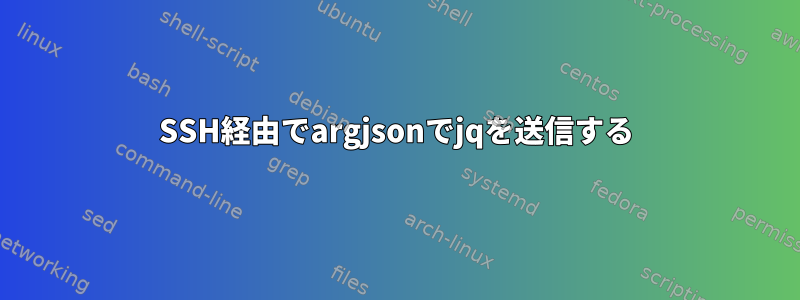
このJSONを取得するためにsshを介してjqコマンドを実行しようとしています。
{
"nodes": {
"app": {
"nodes": 1,
"is_manager": true,
"ip": [
"0.0.0.0"
],
"cpus": 16,
"memory": 64
},
"data": {
"nodes": 1,
"ip": [
"0.0.0.0"
],
"cpus": 16,
"memory": 64
},
"analysis": {
"nodes": 1,
"ip": [
"0.0.0.0"
],
"cpus": 16,
"memory": 64
},
"elastic_kafka_1": {
"nodes": 1,
"ip": [
"0.0.0.0"
],
"cpus": 16,
"memory": 64
},
"elastic_kafka_2": {
"nodes": 1,
"ip": [
"0.0.0.0"
],
"cpus": 16,
"memory": 64
},
"elastic_kafka_3": {
"nodes": 1,
"ip": [
"0.0.0.0"
],
"cpus": 16,
"memory": 64
},
"master": {
"nodes": 1,
"ip": [
"0.0.0.0"
],
"cpus": 16,
"memory": 64
}
}
}
これが私が実行したいものです。
ssh -o StrictHostKeyChecking=no -i key.pem user@"172.13.1.23"
"jq -Rn --argjson original_doc \"\$(<nodes.json)\" '
input | split(\"\u0000\") as \$ips
| \$original_doc
| .nodes.app.ip = \$ips[0]
| .nodes.data.ip = \$ips[1]
| .nodes.analysis.ip = \$ips[2]
| .nodes.elastic_kafka_1.ip = \$ips[3]
| .nodes.elastic_kafka_2.ip = \$ips[4]
| .nodes.elastic_kafka_3.ip = \$ips[5]
| .nodes.master.ip = \$ips[6]
' < <(printf '%s\0' \"\${GCP_INSTANCES[@]}\") > test.json && mv test.json nodes.json"
これは出力です:
{
"nodes": {
"app": {
"nodes": 1,
"is_manager": true,
"ip": "",
"cpus": 16,
"memory": 64
},
"data": {
"nodes": 1,
"ip": "",
"cpus": 16,
"memory": 64
},
"analysis": {
"nodes": 1,
"ip": null,
"cpus": 16,
"memory": 64
},
"elastic_kafka_1": {
"nodes": 1,
"ip": null,
"cpus": 16,
"memory": 64
},
"elastic_kafka_2": {
"nodes": 1,
"ip": null,
"cpus": 16,
"memory": 64
},
"elastic_kafka_3": {
"nodes": 1,
"ip": null,
"cpus": 16,
"memory": 64
},
"master": {
"nodes": 1,
"ip": null,
"cpus": 16,
"memory": 64
}
}
}
ご覧のとおり、sshの構文の問題やその他の問題のため、jqは機能しません。
SSHを使用せずにこのコマンドをローカルでテストしましたが、正常に動作しました。
問題はprintf '%s \ 0'にあるようですが、私が間違っているかどうかはわかりません。
答え1
declare -fすべての参照が正しく実行されたことを確認する最も簡単な方法は、ローカルに定義された関数のテキスト表現を生成し、関数が必要なdeclare -pローカル変数のテキスト表現を生成してシェルにそれを実行させることです。入力する。したがって:
doRemoteWork() {
jq -Rn --argjson original_doc "$(<nodes.json)" '
input | split("\u0000") as $ips
| $original_doc
| .nodes.app.ip = $ips[0]
| .nodes.data.ip = $ips[1]
| .nodes.analysis.ip = $ips[2]
| .nodes.elastic_kafka_1.ip = $ips[3]
| .nodes.elastic_kafka_2.ip = $ips[4]
| .nodes.elastic_kafka_3.ip = $ips[5]
| .nodes.master.ip = $ips[6]
' < <(printf '%s\0' "${GCP_INSTANCES[@]}") >"nodes.json.$$" \
&& mv "nodes.json.$$" nodes.json
}
ssh -o StrictHostKeyChecking=no -i key.pem [email protected] \
"$(declare -p GCP_INSTANCES; declare -f doRemoteWork); doRemoteWork"
答え2
確かな選択肢は、大変な作業を行うことです。地元の。
ssh remote-host 'cat our-document.json' |
jq 'expression...expression...expression' |
ssh remote-host 'cat >tmfile && mv tmpfile our-document.json'


